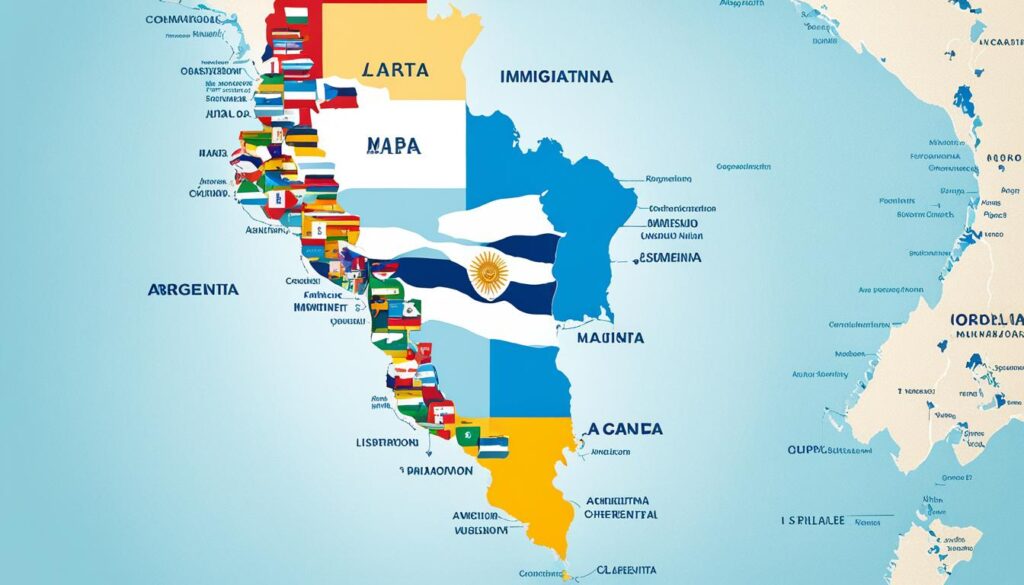Are you considering a new adventure in a vibrant and culturally rich environment? Relocating to Argentina offers myriad opportunities and experiences that can significantly change your life. With its diverse landscapes, welcoming locals, and a wide range of residency options, it’s no wonder that Argentina has become a popular destination for those looking to make a fresh start. This guide will walk you through essential aspects of how to move to Argentina, including immigration processes, cost of living, and job opportunities as an expat. Whether you’re drawn to the bustling streets of Buenos Aires or the serene countryside, understanding what life in Argentina entails will help you adjust and thrive.(Learn more about relocating to Argentina) In fact, Argentina is the eighth-largest country in the world and has over 60,000 expats, particularly from the U.S., contributing to its robust international community1
Key Takeaways
- Understand the various visa options available when relocating to Argentina.
- Explore the cost of living, which is significantly lower compared to the U.S.
- Engage with local expat communities for support and networking opportunities.
- Take advantage of the free and high-quality healthcare system.
- Learn about the job market and consider teaching English as a viable option.
- Prepare for the social and psychological adjustments of moving abroad.
Contact us if you are Interested in Buying Property Abroad!
Understanding Argentina: A Guide for Newcomers
Argentina, officially known as the Republic of Argentina, is a vibrant country located in South America. It spans an impressive area of approximately 2.78 million square kilometers, making it the second largest country in the region after Brazil. With a diverse population of almost 45 million, Argentina presents a unique cultural tapestry rich in history and tradition2. The capital city, Buenos Aires, is home to over 3 million residents and is divided across 48 barrios, each offering a taste of the country’s vibrant lifestyle3.
Basic Facts About Argentina
Among the basic facts about Argentina, its welcoming nature and affordability stand out, attracting many expatriates. Argentina boasts world-class healthcare and education systems, contributing to a high quality of life. Significant migration from Spain and Italy from 1870 to 1930 has shaped its cultural landscape4. The country is known for having the highest density of psychologists per capita globally, indicating its focus on mental health and wellness3.
Reasons to Consider Moving to Argentina
For those contemplating reasons to move to Argentina, the country’s favorable exchange rate is a major draw, allowing visitors with stronger currencies to enjoy an affordable lifestyle3. In addition, an extensive expatriate community, numbering around 60,000, provides invaluable support for anyone considering living in Argentina as an expat2. The beautiful climate, akin to that of southern Europe, combined with cultural events such as the famous Buenos Aires Book Fair, enhances the appeal of this diverse nation3.
How to Move to Argentina: The Immigration Process

Relocating to Argentina involves navigating a series of immigration requirements that vary based on the visa type you select. Understanding these requirements is crucial for a smooth transition and successful application. Argentina offers different visa categories tailored to the unique circumstances of new residents. These visas cater to students, workers, retirees, and others seeking a new life in this vibrant country.
Types of Visas for Moving to Argentina
Different options exist for obtaining an Argentina residency visa, each with its own eligibility criteria. The main categories include:
- Work Visa: Ideal for individuals securing a job in Argentina, this visa requires a job offer from an Argentine employer.
- Student Visa: Geared towards those pursuing educational opportunities, this visa can be obtained by enrolling in an accredited institution.
- Family Reunification Visa: Designed for individuals with Argentine family members, facilitating their relocation.
- Pensionado Visa: Aimed at retirees, it requires proof of a stable monthly pension to qualify for residency.
Application Process for Residency Visa
Obtaining an Argentina residency visa demands specific documentation, including proof of employment, educational enrollment, or a pension statement, which highlights the Argentina immigration requirements that applicants must meet. Processing times range widely; for instance, temporary residence applications may take up to 90 days, while stages for permanent residency could extend longer depending on individual circumstances5. After two years of temporary residency, individuals may become eligible for permanent residency based on criteria like marriage or parental ties6.
Registration Requirements upon Arrival
Upon entering Argentina, it’s mandatory to register with local authorities to obtain a residency permit. This step is vital for establishing legal residency. Fresh arrivals should also prepare for life in Argentina by exploring essential living tips, including how to navigate public services and local customs. Overall, these steps are pivotal to ensure a successful transition and integration into Argentine society tips for moving to Argentina.
Cost of Living in Argentina

Relocating to Argentina involves understanding the cost of living in Argentina, which can significantly differ based on your lifestyle and location. Various factors influence the expenses, especially in major cities like Buenos Aires.
Housing and Rent Prices
Housing prices in Argentina can fluctuate depending on the neighborhood. In Buenos Aires, average monthly rent for an apartment ranges from $400 to $700, depending on size and location7. For those considering longer stays, average monthly rent in neighborhoods like San Telmo can drop to about $2508. Renting in Argentina tends to be about 75% cheaper than in the United States, which makes it quite appealing for expatriates9.
Daily Expenses and Tips for Budgeting
Daily expenses like grocery shopping and dining can also vary. Monthly food expenses in Buenos Aires typically range from $200 to $3007. Dining out is relatively affordable with mid-range restaurants costing between $15 and $25 per person7. A practical tip for budgeting is to allocate around 30% of your expenses to eating out8. Furthermore, monthly utility bills for an 85m2 apartment average between $50 and $80, allowing for effective planning around household costs7.
Healthcare Costs and Insurance Options
When it comes to healthcare costs in Argentina, the scene varies between public and private services. Monthly private insurance premiums can range from $50 to $1007, providing access to a range of healthcare facilities. Visiting a specialist doctor typically costs between $20 and $60, which remains significantly lower than in North America9. Overall, healthcare costs can be about a quarter of what they are in the United States, making it an attractive option for expats9.
With a total average monthly living expense ranging from $1,600 to $2,000, Argentina’s cost of living is estimated to be 30%-50% less than in countries like the United States, Canada, or the UK7. Familiarizing yourself with these financial aspects will help ease your transition as you adjust to life in Argentina.
Contact us if you are Interested in Buying Property Abroad!
Finding Employment as an Expat in Argentina

For expatriates, finding a job in Argentina can be a rewarding yet challenging endeavor due to various factors. Understanding the local job market and its prerequisites is crucial. While there are job opportunities for expatriates, especially in larger cities like Buenos Aires, the competition can be intense.
Job Opportunities and Work Permit Requirements
Job opportunities for expatriates primarily exist in sectors such as banking, IT, oil, tourism, and teaching where proficiency in English is essential. Yet, securing a position may be difficult, as local wages tend to be lower than foreign expectations, creating hurdles for those seeking employment in Argentina10. Moreover, most jobs require a high level of proficiency in Spanish, which is vital for successful job hunting10. Many expatriates find that those who can adapt to local wage structures increase their chances of finding employment in diverse sectors outside exclusive expat roles. The work permit requirements in Argentina mandate that employers adhere to specific regulations, ensuring that both local and foreign workers are treated fairly11.
Networking and Expat Communities
Building connections within local expat communities is key to uncovering unadvertised job opportunities. These networks often provide insights and support that are invaluable for newcomers seeking to integrate into the job market. The importance of personal relationships and networking cannot be overstated, as they play a significant role in workplace culture in Argentina10. Engaging with local events or groups can lead to potential job leads and foster both personal and professional growth.
Tips for Successful Job Hunting
When hunting for a job in Argentina, there are several strategies to consider. One effective approach is to customize your resume to reflect the style and expectations of the Argentine job market. Utilizing local job boards, international companies, and networking platforms can significantly enhance your visibility in the job market. Prior to moving, securing a job offer can greatly simplify the transition and ensure a smoother acclimatization period. Being aware of labor laws, which include employee rights related to working conditions and wages, is essential for understanding workplace dynamics in Argentina11. Lastly, adaptability and open-mindedness regarding job expectations can lead to successful employment outcomes.
| Aspect | Description |
|---|---|
| Job Market Size | Limited opportunities for expatriates, primarily in urban centers. |
| Language Requirement | Spanish proficiency often required for most employment. |
| Salary Comparisons | Local wages lower than many expatriates expect, affecting job choices. |
| Networking | Critical for uncovering job opportunities and cultural integration. |
| Labor Laws | Stringent regulations ensure worker rights and protections. |
Conclusion
Relocating to Argentina opens the door to a vibrant culture, an enriching community of expatriates, and abundant opportunities. Over the years, Argentina has demonstrated its welcoming nature toward migrants, as seen by its history which includes welcoming approximately 6 million European migrants during the Age of Mass Migration, thereby contributing significantly to the country’s economic and social fabric12. Moving to Argentina is about more than just the practicalities of visas and residency; it is an invitation to embrace a new way of life filled with unique experiences.
As a prospective expatriate in Argentina, thorough research and preparation are vital to ease the transition. Familiarizing yourself with essential details like the visa application process and the importance of obtaining a National Identity Card (DNI) within 90 days of arrival can enhance your experience and integration into the community here. Argentina’s strong policies towards migration demonstrate a commitment to supporting newcomers, making it an appealing destination for those seeking to make a fresh start.
Ultimately, relocating to Argentina promises great potential for personal growth and fulfillment. The challenges and joys of adapting to a new environment only add to the richness of life in this diverse nation. With the right knowledge and mindset, becoming part of Argentina’s vibrant expat community can indeed be a transformative journey1314.
Contact us if you are Interested in Buying Property Abroad!
FAQ
What is the first step to moving to Argentina?
How much does it cost to live in Argentina?
How do I find a job in Argentina as an expatriate?
What types of visas are available for moving to Argentina?
What are the healthcare costs like in Argentina?
Do I need to register with local authorities upon arrival in Argentina?
What are some tips for budgeting as an expat in Argentina?
How do I find a job in Argentina as an expatriate?
What types of visas are available for moving to Argentina?
What are the healthcare costs like in Argentina?
Do I need to register with local authorities upon arrival in Argentina?
What are some tips for budgeting as an expat in Argentina?
Source Links
- https://internationalmoving.com/moving-to-argentina/
- https://internationalliving.com/countries/argentina/
- https://nomadflag.com/living-in-argentina/
- https://www.internations.org/argentina-expats/guide/moving-to-short
- https://immi.legal/how-to-immigrate-to-argentina/
- https://nomadcapitalist.com/global-citizen/second-passport/how-to-get-argentina-citizenship-and-residency/
- https://www.remoteyear.com/blog/cost-of-living-in-argentina
- https://www.businessinsider.com/how-much-i-spend-living-buenos-aires-rent-cheap-cities-2022-9
- https://internationalliving.com/countries/argentina/cost-of-living-in-argentina/
- https://www.expatarrivals.com/americas/argentina/working-argentina
- https://becci.dk/work-in-argentina/
- https://seperez.faculty.ucdavis.edu/wp-content/uploads/sites/743/2022/08/Argentina_Migration_Chapter.pdf
- https://journals.openedition.org/poldev/4939
- https://www.imf.org/external/np/ieo/2003/arg/index.htm

Comments